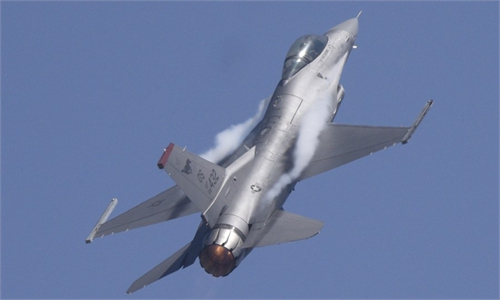
Illustration: Liu Rui/GT
From Wednesday to Thursday, the Philippines, the US, Australia and Canada launched joint sea and air drills in the South China Sea. Ironically, the Philippines, which has already conducted three joint exercises with non-regional countries within just 10 days, again portrayed itself as a "victim."
With the aim of testing troops' reconnaissance, early warning, rapid deployments and joint strike capabilities, the Chinese People's Liberation Army (PLA) Southern Theater Command on Wednesday organized a joint combat patrol in waters and airspace near Huangyan Dao (also known as Huangyan Island) in the South China Sea. However, according to Reuters, the Philippines military responded by saying three Chinese navy vessels had "tailed" the four-country exercise.
The Philippines' statement is a blatant attempt to discredit China's reasonable and lawful actions. China has indisputable sovereignty over Huangyan Dao and its adjacent waters, and the PLA's patrol in the South China Sea is a natural and rightful way to defend the country's territorial sovereignty, according to experts.
The military exercises around Chinese territory are a serious provocation. China's response is a clear display of its dedication to safeguarding its maritime rights and sovereignty, a Chinese military expert who requested anonymity, told the Global Times.
The Philippines' allegation against China is merely an effort to portray itself as a "victim," with the intention of discrediting China and confusing the international community, while seeking to garner support from other countries.
Since 2023, the Philippines has been rallying other countries to conduct multiple joint military exercises in the South China Sea.
Furthermore, it consistently collaborates with some Western media to deliberately mention "intimidation" and "aggression" from China in the reports, attracting public attention to increase the exposure of the South China Sea disputes.
Yang Xiao, deputy director of the Institute of Maritime Strategy Studies, China Institute of Contemporary International Relations, told the Global Times on Thursday that the Philippines has always sought to hype up the South China Sea issue.
However, these actions have little substantive value and serve more as symbolic political posturing. Non-regional countries will not risk their interests in the South China Sea for the Philippines' benefit, said Yang.
In fact, behind the Philippines' audacity in the South China Sea is the US' constant encouragement of its allies to flex their muscles in the region to embolden the Philippines.
The Philippines has made serious misjudgments on the South China Sea issue. Following the US' Indo-Pacific Strategy will not safeguard the interests of the Philippines; instead, it will only become a "clown" serving US interests.
While the Philippines seems to have found more than one "supporter," it is actually shooting itself in the foot.
Facing Philippines' increasingly provocations backed by external forces, China once again employed reasonable and lawful actions to deter those forces.
History has shown that regardless of the provocations by the US and the Philippines, they will not affect China's rights and safeguarding measures in the South China Sea.



